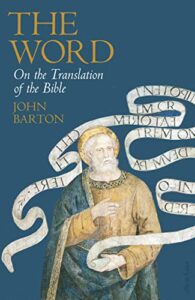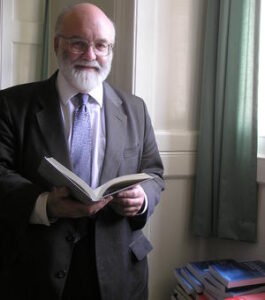BARTON, J. The Word: On the Translation of the Bible. London: Penguin, 2022, 320 p. – ISBN 9780241448816.
A Bíblia é considerada universal e especial, a fonte de verdades fundamentais inscritas em palavras exatas e sagradas. Durante grande parte da história do judaísmo e quase a totalidade do cristianismo, no entanto, os crentes entenderam esmagadoramente as escrituras não nas línguas em que foram escritas pela primeira vez, mas sim em suas próprias – em tradução.
quase a totalidade do cristianismo, no entanto, os crentes entenderam esmagadoramente as escrituras não nas línguas em que foram escritas pela primeira vez, mas sim em suas próprias – em tradução.
Este livro examina como santos, estudiosos e intérpretes desde os tempos antigos até o presente produziram versões da Bíblia na linguagem de seus dias, mantendo-se fiéis ao original. Explica os desafios que eles negociaram, desde pequenas ambiguidades textuais até a amplitude de estilo e diferenças gritantes na forma e pensamento entre os primeiros escritos e os mais recentes, e expõe a influência que eles têm em algumas das questões mais profundas da fé: a natureza de Deus, a existência da alma e a possibilidade de sua salvação.
Lendo dezenas de traduções ao lado de seus antigos antecedentes hebraicos e gregos, John Barton traça a migração de palavras e ideias bíblicas através das fronteiras linguísticas, iluminando os significados originais, bem como as formas como foram reformulados. ‘Os tradutores têm estado entre os principais agentes na mediação da mensagem da Bíblia’, escreve ele, ‘até mesmo na formação do que é essa mensagem’.
The Bible is held to be both universal and specific, the source of fundamental truths inscribed in words that are exact and sacred. For much of the history of Judaism and almost the entirety of Christianity, however, believers have overwhelmingly understood scripture not in the languages in which it was first written but rather in their own – in translation.
This book examines how saints, scholars and interpreters from ancient times down to the present have produced versions of the Bible in the language of their day while remaining true to the original. It explains the challenges they negotiated, from minute textual ambiguities up to the sweep of style and stark differences in form and thought between the earliest writings and the latest, and it exposes the bearing these have on some of the most profound questions of faith: the nature of God, the existence of the soul and possibility of its salvation.
Reading dozens of renderings alongside their ancient Hebrew and Greek antecedents, John Barton traces the migration of biblical words and ideas across linguistic borders, illuminating original meanings as well as the ways they were recast. ‘Translators have been among the principal agents in mediating the Bible’s message,’ he writes, ‘even in shaping what that message is.’ At the separation of Christianity from Judaism and Protestantism from Catholicism, Barton demonstrates, vernacular versions did not only spring from fault lines in religious thinking but also inspired and moulded them. The product of a lifetime’s study of scripture, The Word itself reveals the central book of our culture anew – as it was written and as we know it.
John Barton was the Oriel and Laing Professor of the Interpretation of Holy Scripture at the University of Oxford from 1991 to 2014 and since 1973 has been a serving priest in the Church of England. He is the author of numerous books on the Bible, co-editor of The Oxford Bible Commentary and editor of The Cambridge Companion to Biblical Interpretation. He was elected a Fellow of the British Academy in 2007 and is a Corresponding Fellow of the Norwegian Academy of Science and Letters.

